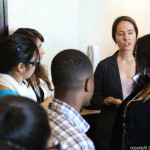We have much more to do and your continued support is needed now more than ever.
Largest Young Professional Track to Date Hosted by Society for American Indian Government Employees
As part of its 10th anniversary conference last week (June 4–8, 2012) just outside of Denver, Colorado, the Society for American Indian Government Employees (SAIGE), hosted its largest youth convening ever. The fifty-five students and young professionals hailing from more than two dozen colleges and universities (including many tribal colleges and universities) explored a range of career and other professional development issues over five days, networking with senior government leaders in nearly every branch of the US government, including the U.S. Department of the Interior and the Environmental Protection Agency.
NWF Board Member Forges Link

Clean Energy, Sustainable Water Top List of Concerns
When asked, “What green campus issues matter to you?” students identified three priority topics: sustainable use of water, clean energy and reducing waste. For each of the three topics, at least one student rated his or her campus as making an excellent effort in that area, allowing students to identify and partner with one another to strengthen projects. We placed ourselves physically along an imaginary “sustainability continuum” to help visualize the status of various efforts, to encourage movement and diversify the workshop format.
The workshop aimed to give SAIGE student leaders a deeper understanding of:
- The national scope of the higher education for sustainability movement and how Native American young people as well as tribal colleges and universities (TCUs) are leading the movement;
- Why environmental (or sustainability) education makes a difference in academic success and student well being; and
- An especially effective approach to peer-to-peer coaching (GROW) that can help identify and further personal and professional goals.
Tribal Colleges and Universities Leading Provide Green Campus Models
Judging from the discussion, most of the student participants were unaware of just how boldly some of their peers are leading. For example, they learned about clean energy innovation at Blackfeet Community College in Browning, MT, which is generating 50% of its electricity from wind and efforts at College of Menominee Nation, where all students take a course on sustainable development (See: Kuslikis and Beau Mitchell for additional information) as part of their general education requirement and where a position is dedicated to facilitating cross-campus sustainability initiatives.
(A note: This workshop was an offering of NWF’s Campus Ecology Program which empowers student leaders to green their curricula, campuses and communities).





















